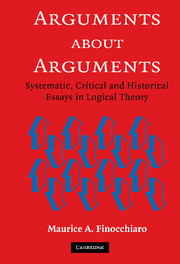Book contents
- Frontmatter
- Contents
- Preface and Acknowledgments
- Introduction : An Approach to a Branch of Logic
- Theorizing about reasoning and argument
- 1 Informal Logic and the Theory of Reasoning (1984)
- 2 An Historical Approach to the Study of Argumentation (1987)
- 3 Methodological Problems in Empirical Logic (1989)
- 4 Two Empirical Approaches to the Study of Reasoning (1994)
- 5 Critical Thinking, Critical Reasoning, and Methodological Reflection (1996)
- Fallacies and asymmetries
- Critiques
- Historical analyses
- Selected Bibliography
- Index
2 - An Historical Approach to the Study of Argumentation (1987)
from Theorizing about reasoning and argument
Published online by Cambridge University Press: 05 February 2015
- Frontmatter
- Contents
- Preface and Acknowledgments
- Introduction : An Approach to a Branch of Logic
- Theorizing about reasoning and argument
- 1 Informal Logic and the Theory of Reasoning (1984)
- 2 An Historical Approach to the Study of Argumentation (1987)
- 3 Methodological Problems in Empirical Logic (1989)
- 4 Two Empirical Approaches to the Study of Reasoning (1994)
- 5 Critical Thinking, Critical Reasoning, and Methodological Reflection (1996)
- Fallacies and asymmetries
- Critiques
- Historical analyses
- Selected Bibliography
- Index
Summary
Elements of the Historical Approach
The primary purpose of this chapter is to elucidate and illustrate an historical approach to the study of argumentation. I am also interested in justifying this approach and in discussing a number of difficulties that it faces and some fruitful lines of inquiry it suggests. However, space limitations will force me to be rather sketchy and allusive in regard to this justification and discussion, whose details will have to await some other occasion. Nevertheless, I invite reactions to the secondary topics as well as to the central ones.
By way of elucidation, an historical approach is to be understood as a type of empirical approach, empirical primarily in the sense in which this term is contrasted to an apriorist, rationalistic, or intellectualist orientation. In this context, formal logic, or at least the relevant parts of formal logic, may be taken as an example of the apriorist approach, while cognitive psychology may be regarded as an instance of a different type of empirical approach. The main methodological difference between cognitive psychology and the historical approach advocated here is that the former is experimental, while the latter is merely observational. Whether the historical-observational or psychological-experimental approach is preferable is an issue of great interest and importance, which for the moment I merely want to raise rather than discuss, let alone settle.
Information
- Type
- Chapter
- Information
- Arguments about ArgumentsSystematic, Critical, and Historical Essays In Logical Theory, pp. 34 - 45Publisher: Cambridge University PressPrint publication year: 2005
